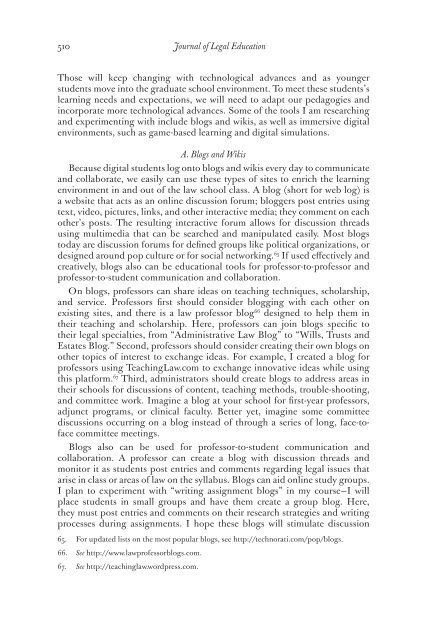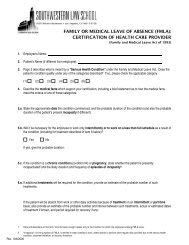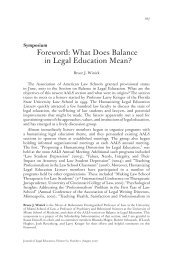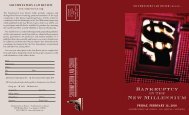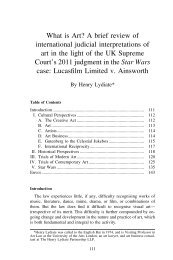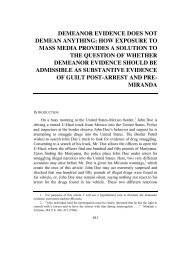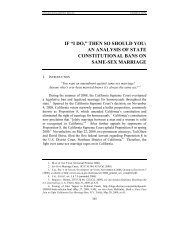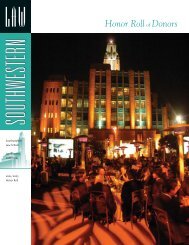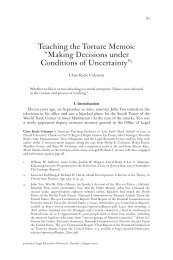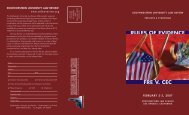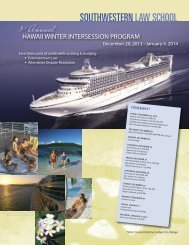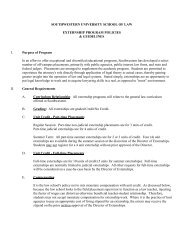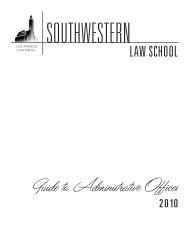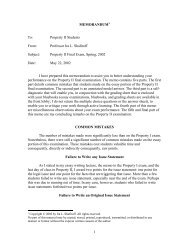An Autobiography of a Digital Idea - Southwestern Law School
An Autobiography of a Digital Idea - Southwestern Law School
An Autobiography of a Digital Idea - Southwestern Law School
Create successful ePaper yourself
Turn your PDF publications into a flip-book with our unique Google optimized e-Paper software.
510 Journal <strong>of</strong> Legal Education<br />
Those will keep changing with technological advances and as younger<br />
students move into the graduate school environment. To meet these students’s<br />
learning needs and expectations, we will need to adapt our pedagogies and<br />
incorporate more technological advances. Some <strong>of</strong> the tools I am researching<br />
and experimenting with include blogs and wikis, as well as immersive digital<br />
environments, such as game-based learning and digital simulations.<br />
A. Blogs and Wikis<br />
Because digital students log onto blogs and wikis every day to communicate<br />
and collaborate, we easily can use these types <strong>of</strong> sites to enrich the learning<br />
environment in and out <strong>of</strong> the law school class. A blog (short for web log) is<br />
a website that acts as an online discussion forum; bloggers post entries using<br />
text, video, pictures, links, and other interactive media; they comment on each<br />
other’s posts. The resulting interactive forum allows for discussion threads<br />
using multimedia that can be searched and manipulated easily. Most blogs<br />
today are discussion forums for defined groups like political organizations, or<br />
designed around pop culture or for social networking. 65 If used effectively and<br />
creatively, blogs also can be educational tools for pr<strong>of</strong>essor-to-pr<strong>of</strong>essor and<br />
pr<strong>of</strong>essor-to-student communication and collaboration.<br />
On blogs, pr<strong>of</strong>essors can share ideas on teaching techniques, scholarship,<br />
and service. Pr<strong>of</strong>essors first should consider blogging with each other on<br />
existing sites, and there is a law pr<strong>of</strong>essor blog 66 designed to help them in<br />
their teaching and scholarship. Here, pr<strong>of</strong>essors can join blogs specific to<br />
their legal specialties, from “Administrative <strong>Law</strong> Blog” to “Wills, Trusts and<br />
Estates Blog.” Second, pr<strong>of</strong>essors should consider creating their own blogs on<br />
other topics <strong>of</strong> interest to exchange ideas. For example, I created a blog for<br />
pr<strong>of</strong>essors using Teaching<strong>Law</strong>.com to exchange innovative ideas while using<br />
this platform. 67 Third, administrators should create blogs to address areas in<br />
their schools for discussions <strong>of</strong> content, teaching methods, trouble-shooting,<br />
and committee work. Imagine a blog at your school for first-year pr<strong>of</strong>essors,<br />
adjunct programs, or clinical faculty. Better yet, imagine some committee<br />
discussions occurring on a blog instead <strong>of</strong> through a series <strong>of</strong> long, face-t<strong>of</strong>ace<br />
committee meetings.<br />
Blogs also can be used for pr<strong>of</strong>essor-to-student communication and<br />
collaboration. A pr<strong>of</strong>essor can create a blog with discussion threads and<br />
monitor it as students post entries and comments regarding legal issues that<br />
arise in class or areas <strong>of</strong> law on the syllabus. Blogs can aid online study groups.<br />
I plan to experiment with “writing assignment blogs” in my course—I will<br />
place students in small groups and have them create a group blog. Here,<br />
they must post entries and comments on their research strategies and writing<br />
processes during assignments. I hope these blogs will stimulate discussion<br />
65. For updated lists on the most popular blogs, see http://technorati.com/pop/blogs.<br />
66. See http://www.lawpr<strong>of</strong>essorblogs.com.<br />
67. See http://teachinglaw.wordpress.com.


